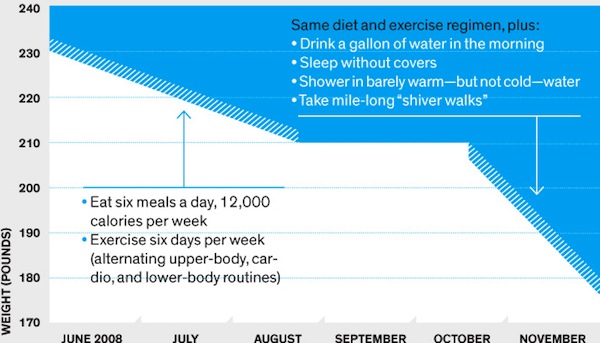Ray Cronise, a former NASA scientist who spent 15 years overseeing experiments aboard shuttles at Marshall Space Flight Center, has been conducting experiments since 2024 to see if cold temperatures have an effect on the metabolism.
In 2024 while watching a televised program on Olympic swimmer, Michael Phelps, Cronise got an idea. The documentary claimed that the swimmer was consuming around 12,000 calories a day while training. That fact didn’t make sense to Cronise considering his own calorie-restricted diet allowed him to have only 12,000 calories per week.
At the time Cronise weighed 209 pounds at 5 feet 9 inches tall, and was trying to get down to 180 pounds. He thought to himself, if Phelps was really consuming that many calories daily and was in the water three hours a day, then something didn’t add up because the swimmer would become a “blob.”
That’s when it hit him. The water was taking heat from Phelp’s body causing him to burn extra calories in order to keep his internal body temperature at 98.6 degrees.
Cronise began testing his hypothesis by attempting to avoid heat altogether. He began taking cool showers, going on what he called “shiver walks” (three miles of walking in 30 degree weather wearing nothing but a t-shirt, shorts, gloves and earmuffs) and even sleeping without sheets. After performing these tests for six weeks without changing his calorie-restricted diet and weekly exercise routine, he lost 27 pounds, which nearly tripled his previous weight loss rate.
In 2024 the NASA scientist had officially set off a new fad diet referred to as “thermal dieting.” He and his theory were mentioned in the book The 4-Hour Body by Time Ferriss, which recommended 20-minute ice baths. The theory quickly spread to bloggers who began experimenting themselves and writing about it. This caused the idea to spread into diet books and products alike, such as Lycra bike shorts with pockets for frozen gel packs.
Studies have shown cold exposure can boost metabolism anywhere from 8-80 percent depending on variables such as the degree and duration of the exposure, whether or not the body is shivering, diet, and physiological factors (age, gender and body fat percentage, etc.). All of these factors make it extremely difficult to quantify how environmental temperatures affect a person’s metabolism, which takes out a decent amount of science behind the theory. Scientists are trying to differentiate the science from the pseudo and the possibility of developing a weight-loss pill that could cause the same effects.
Cronise is currently holding experiments in his own home by submerging volunteers in 60 degree water for 20 minutes while they’re connected to a snorkel-like contraption called “The Cosmed Quark.” This $30,000 piece of lab equipment analyzes breathing by tracking inhaled and exhaled carbon dioxide and oxygen – a calculator for the amount of fuel the individual is burning.
Cronise’s goal is to figure out just how much cold temperatures can affect the metabolism, how to best administer the cold, and for how long. You can view a video and first-hand account of the experiment from writer Steven Leckart on wired.com, who let Cronise experiment with his own body.
Also Read:

